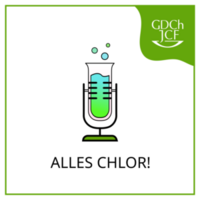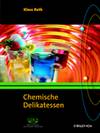

The videos of the GDCh can be found on the public relations pages and in the following places:
The JCF (JungesChemieForum) podcast "Alles Chlor" can be found on the JCF website and in the GDCh.app in the category "Podcast: Alles Chlor"

Beginning with Herrmann Staudinger, macromolecular chemistry has been a central part of the research landscape in Germany for almost 100 years. Many scientific, and meanwhile also economic, achievements have been achieved by the large number of outstanding polymer chemists in Germany in the past and today. The university guide summarizes the extensive spectrum of current research on polymers and macromolecules - all working group that deal with polymer research in Germany are presented in a short portrait.
The university guide was developed by the GDCh Division of Macromolecular Chemistry.
On the occasion of its anniversary, the German Chemical Society (GDCh) has published a book that illuminates the achievements and possibilities of chemistry in all its facets in an entertaining way. "Infinite expanses. Criss-cross through the chemical universe” is the title of the book published by Wiley-VCH. Numerous renowned authors take the readers on an understandable and diverse journey through the world of chemistry. The book was published by the then GDCh President Thisbe K. Lindhorst, the former GDCh President Hans-Jürgen Quadbeck-Seeger and the GDCh itself.
In twelve chapters, recognized experts deal with achievements, applications and innovations in chemistry as well as with challenges and new approaches. Which renewable raw materials are there and how can carbon dioxide or hydrogen be used for energy production in the future? To what extent can genetic research help to develop a bacterial immune system? What alternatives to antibiotics are conceivable? How can we prevent the climate catastrophe? What possibilities does nuclear chemistry offer? Which environmentally friendly materials and solutions for information storage are chemists working on worldwide? How can recycling technologies be improved?
The book is aimed at both scientific laypersons and experts and, in a colorful kaleidoscope, provides many approaches to getting to know and understand the importance of chemistry for our world better.
The history of the chemical industry in the Third Reich has been extensively documented, but an investigation of the scientific organizations of chemists has so far been lacking. The GDCh has commissioned the experienced science historian and author of several scientific-historical works, Professor Helmut Maier, with a study on the German Chemical Society and the Association of German Chemists in the Nazi regime. This resulted in the book "Chemists in the Third Reich". He covers the entire period from 1933 to 1945 and in his work also opens up previously inaccessible documents.
The book - it addresses chemists as well as historians and of course all those interested in history - illuminates the history of the two predecessor organizations of the GDCh and provides a well-founded examination of the entanglements of individuals and the chemical societies as such in the Nazi regime of injustice.
From the foreword by Professors Henning Hopf and Petra Mischnick: "It is a mistake to believe that historical events - and especially negative events - can be »made good« or even »overcome« in any way. But one can and must remember them in as much detail as possible. The present work serves this purpose.”

Not a trace of boredom, but plenty of reading fun and learned something about chemistry along the way? Klaus Roth manages to achieve this like no other. He not only explains - no, he brings chemistry to life with all its funny, serious and fascinating sides.
Let us take you on a wild ride through chemistry with lots of colorful illustrations. But you'd better take a sip of fresh water first: the journey will be long, but never boring. But stop! Please don't use normal water: it has to be energized, revitalized, clustered, stretched, invigorated and clockwise - or is it all just hocus-pocus?
Photosynthesis, which gives us the air to breathe and allows orchids to grow, is no hocus-pocus. But what does this have to do with a small green cactus? After reading it you will know, I promise! Chemistry is without a doubt the main player in nature, but then it is much more - it has changed our society. How was it actually possible that a tiny pill first caused a stir and at the same time gave women self-determination? What a success story in chemistry.
Things get hot when Klaus Roth devotes himself to capsaicin ? the fiery ingredient in paprika, the heat of which has brought tears to many a person's eyes. Klaus Roth doesn't stop at old clichés in his new book either: artificial sweeteners are bad, natural sugar is good, nicotine is the harmful thing about smoking, is it really? Really strong tobacco!
Do you know the bitter quinine, an alkaloid? You've probably drunk it before, at least if you like tonic water. But more importantly, it also cures malaria. Is that where the popular wisdom comes from, ?Good medicine must taste bitter??
At the end it smells wonderfully good again. It's Christmas time at the chemical confectionery - a wonderfully contemplative end, after many fascinating stories. At the end of the day, that's how it should be: chemistry isn't complicated, chemistry is fun!

It is the official book of the German Chemical Society (GDCh) for the International Year of Chemistry 2011. Atmospheric chemistry has become increasingly popular since the ozone hole and climate debates at the latest. Terms such as ozone, CFC, CO 2 and nitrogen oxides are on everyone's lips. But who really knows? Reinhard Zellner, Professor of physical chemistry at the University of Duisburg-Essen, and his numerous co-authors give interested citizens the right answers to their questions. They describe in an understandable way what chemistry takes place in the atmosphere between earth and space, why atmospheric chemistry chemistry and the substances in the atmosphere can influence the climate, which substances require special attention, how they get into the atmosphere and how undesired developments can be avoided can counteract. The book is richly illustrated and provided with meaningful graphics and tables. Such a comprehensive and comprehensible presentation of the connections did not previously exist on the German book market.

Not boring at all - chemistry is exciting, witty, extremely useful and by no means incomprehensible, as Klaus Roth shows us in an entertaining way - and he also shows that the way to chemistry is through the stomach. Chemical processes give crispy bread the fragrant crust, and without the chemical interplay between egg yolk, oil and water, a three-star chef's finesse is useless if he wants to create heavenly mayonnaise or hollandaise sauce. Even the Sunday breakfast egg only succeeds with a portion of chemicals. And she lets the champagne tingle on our tongues, but also makes us happy with a hangover after excessive consumption. Chemistry also saves us from deadly diseases like the sailor's disease scurvy - credit goes to the discoverer of vitamin C! Chemistry increases our quality of life in many areas that at first glance we do not associate with this natural science at all. When we enjoy the wonderful sound of music on our CD player or watch a funny video on DVD, we owe it to chemistry. Interesting and precious things, from the serious to the bizarre, are presented by Klaus Roth in a wonderfully understandable and humorous way! The book was published by Wiley-VCH in Weinheim. It is available in bookstores.

The book Chemische Delikatessen, published in 2007 by Professor Dr. Klaus Roth, Berlin, is a "Best of" of the author's essays that appear regularly in the "strange, exciting, everyday" section of the GDCh journal Chemie in unserer Zeit. In an entertaining and informative way, Klaus Roth takes the reader on a journey to the most diverse scenes in which chemistry plays an important role. In doing so, he covers a wide range that includes the description of chemical processes as well as anecdotes from the scientific community and comments on statements by our prominent politicians. The GDCh will award a special edition of the book from May 2007 as a prize for the best high school graduate in chemistry. The book was published by Wiley-VCH in Weinheim. It is available in bookstores.

This is the official book for the Year of Chemistry 2003, published by the GDCh and funded by the BMBF. On more than 230 pages, a daily routine is used to show that chemistry shapes our everyday life in a variety of ways that we can hardly imagine life without - even if we often don't know or realize it. This book shows where we encounter it everywhere. Entertainingly written by Kristin Mädefessel-Herrmann, Friederike Hammar and Hans-Jürgen Quadbeck-Seeger, graphically appealing and always understandable, it is exciting reading for laypeople and experts alike.

Green and chemistry - a contradiction in terms? no way! The chemical industry is aware of its responsibility for the environment and is strongly committed to developing waste-avoiding, material- and energy-saving processes. Not only the improvements that have already been achieved, but also environmentally-related thinking and acting should be conveyed at an early stage in school and university. This work shows how to do this.

A colorful bouquet of eyewitness reports bound into a book: This is the anniversary volume of the GDCh "Chemie Experiences - 50 Years GDCh" from 1999. 28 well-known chemists report from the period from reconstruction to reunification and beyond. What was talked about and discussed, researched and worked on? "Chemie Experiences" shows many milestones in chemistry from the past 50 years.
The autobiographical series "Lifetime Achievements in Chemistry" provides insights into the life and thinking of outstanding researchers in the mirror of the time. What role does the uninterrupted sequence of hypotheses, experiments and interpretations play in cutting-edge chemical research, what role do the impulses of mentors, employees and students or also those of competitors play? Successful scientists describe authentically and personally how new things are created in the natural sciences.
An advisory board appointed by the Board of the Division of the history of chemistry section of the German Chemical Society (GDCh) directs the series.
This page has been machine translated. If you have any feedback or comments please feel free to contact us. 
last modified: 24.04.2023 11:59 H from Translator